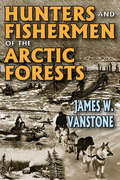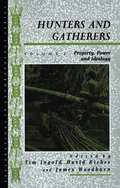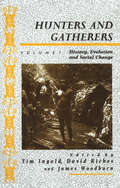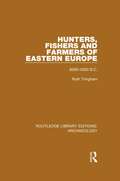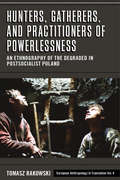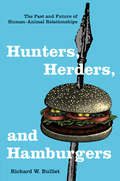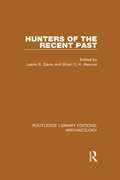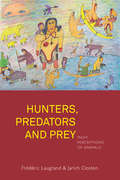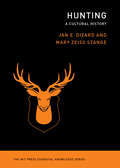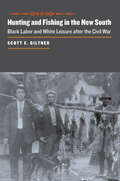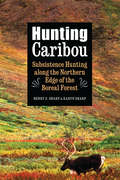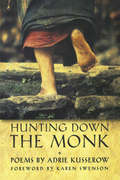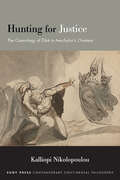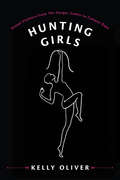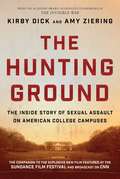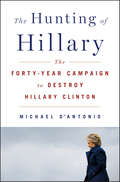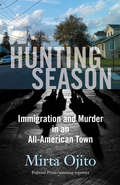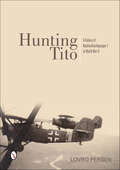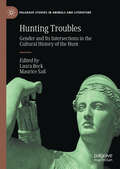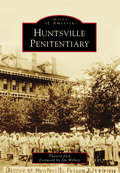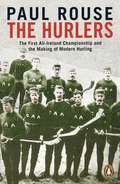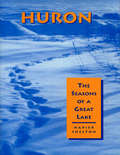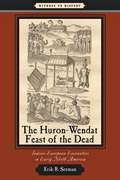- Table View
- List View
Hunters and Fishermen of the Arctic Forests
by James W. VanStoneThe great expanse of Arctic and Sub-Arctic lands that stretch across the northern edge of the American continent is as difficult and demanding to human beings as any in the world. The Athapaskan-speaking Indians who made it their home never captured the imagination of popular writers as did the Eskimo who lived on their northern borders and the Plains Indians who lived to the south. Except to anthropologists, the Athapaskans have remained in relative obscurity, known intimately only to the missionaries, the traders and trappers, and the prospectors who invaded their forbidding territory.VanStone has captured the elements of the basic adaptive strategy by which these Indians mastered their intransigent environment and made it their home over many centuries, and in doing so, he has perhaps also found the reasons why they have not had as much impact on Western thought as other Native Americans. The Plains Indians, with the blood and thunder of their raidings, the individual drama of their vision quests, appealed to that part of our culture that was forged on the frontier where both action and isolation were primary qualities. The Eskimos, with their elaborate technology for extracting a livelihood from the Arctic ice appealed to Yankee ingenuity.Athapaskan culture was of a different order--less dramatic, but no less adaptive. Northern lands are not richly endowed with sustenance for human life. These adaptations have not only required proficiency with tools and techniques for exploiting this difficult habitat, but also the creation of institutions for collaboration in these endeavors. Hunters and Fishermen of the Arctic Forests illuminates this relatively obscure area of the world and brings it, and the cultures it supported, into the context of modern anthropological research.
Hunters and Gatherers: Vol II: Property, Power and Ideology (Explorations in Anthropology)
by Tim Ingold David Riches James WoodburnAll that is central to the dynamic process in human society is evident in the study of hunter-gatherers - peoples whose subsistence way of life reflects the original form of human adaptation. This is the thesis of these wide-ranging volumes in which internationally leading scholars consider hunter-gatherer peoples in Africa, Asia, Australia and North America and reflect theoretically on the hunter-gatherer condition.Volume 1: Hunters and Gatherers - History, Evolution and Social ChangeVolume II: Hunters and Gatherers - Property, Power and Ideology
Hunters and Gatherers: Vol I: History, Evolution and Social Change (Explorations in Anthropology)
by Tim Ingold David Riches James WoodburnAll that is central to the dynamic process in human society is evident in the study of hunter-gatherers - peoples whose subsistence way of life reflects the original form of human adaptation. This is the thesis of these wide-ranging volumes in which internationally leading scholars consider hunter-gatherer peoples in Africa, Asia, Australia and North America and reflect theoretically on the hunter-gatherer condition.Volume 1: Hunters and Gatherers - History, Evolution and Social ChangeVolume II: Hunters and Gatherers - Property, Power and Ideology
Hunters, Fishers and Farmers of Eastern Europe, 6000-3000 B.C. (Routledge Library Editions: Archaeology)
by Ruth TringhamEastern Europe, in this book, embraces the area formally referred to as the ‘Marchlands of Europe’, sometimes as Eastern Central Europe, and which included, when this book was originally published in 1971, Yugoslavia, Bulgaria, Rumania, Hungary, Czechoslovakia, East Germany and Poland. This book presented for the first time the archaeological material related to the prehistory of Central and West Europe, describing the evidence for the earlier prehistory – settlement patterns, means of subsistence and material culture – in the various natural environments of this area. It looks at the Baltic coast, the north and east European plains, the Carpathian mountain ring, the Danube basin and the Adriatic and Black Sea coasts. The evidence for late Mesolithic hunting-fishing groups is examined, their techniques and their reaction to the introduction and spread of agriculturalists, as well as the development and activities of both food-gatherers and food-producers until the early use and manufacture of metal objects. 3000 years of prehistory are covered in a way which is designed to be intelligible and useful to all those who are interested in prehistory and in eastern Europe.
Hunters, Gatherers, and Practitioners of Powerlessness: An Ethnography of the Degraded in Postsocialist Poland (European Anthropology in Translation #6)
by Tomasz RakowskiThe socio-economic transformations of the 1990s have forced many people in Poland into impoverishment. Hunters, Gatherers, and Practitioners of Powerlessness gives a dramatic account of life after this degradation, tracking the experiences of unemployed miners, scrap collectors, and poverty-stricken village residents. Contrary to the images of passivity, resignation, and helplessness that have become powerful tropes in Polish journalism and academic writing, Tomasz Rakowski traces the ways in which people actively reconfigure their lives. As it turns out, the initial sense of degradation and helplessness often gives way to images of resourcefulness that reveal unusual hunting-and-gathering skills.
Hunters, Herders, and Hamburgers: The Past and Future of Human-Animal Relationships
by Richard BullietRichard W. Bulliet has long been a leading figure in the study of human-animal relations, and in his newest work, Hunters, Herders, and Hamburgers, he offers a sweeping and engaging perspective on this dynamic relationship from prehistory to the present. By considering the shifting roles of donkeys, camels, cows, and other domesticated animals in human society, as well as their place in the social imagination, Bulliet reveals the different ways various cultures have reinforced, symbolized, and rationalized their relations with animals. Bulliet identifies and explores four stages in the history of the human-animal relationship-separation, predomesticity, domesticity, and postdomesticity. He begins with the question of when and why humans began to consider themselves distinct from other species and continues with a fresh look at how a few species became domesticated. He demonstrates that during the domestic era many species fell from being admired and even worshipped to being little more than raw materials for various animal-product industries. Throughout the work, Bulliet discusses how social and technological developments and changing philosophical, religious, and aesthetic viewpoints have shaped attitudes toward animals.Our relationship to animals continues to evolve in the twenty-first century. Bulliet writes, "We are today living through a new watershed in human-animal relations, one that appears likely to affect our material, social, and imaginative lives as profoundly as did the original emergence of domestic species." The United States, Britain, and a few other countries are leading a move from domesticity, marked by nearly universal familiarity with domestic species, to an era of postdomesticity, in which dependence on animal products continues but most people have no contact with producing animals. Elective vegetarianism and the animal-liberation movement have combined with new attitudes toward animal science, pets, and the presentation of animals in popular culture to impart a distinctive moral, psychological, and spiritual tone to postdomestic life.
Hunters of the Recent Past (Routledge Library Editions: Archaeology)
by Leslie B. Davis Brian O. K. ReevesOne of a series of more than 20 volumes resulting from the World Archaeological Congress, September 1986, which brought together archaeologists and anthropologists from many parts of the world, academics from contingent disciplines, and non-academics from a wide range of cultural backgrounds. This book considers prehistoric and more recent manifestations of human hunting behaviour, with a general emphasis on communal hunting. It demonstrates that the combination of archaeological, ethnographic and ethnohistorical approaches provides a researched basis for consideration of the topic on worldwide, regional, and local scales. It includes theoretical and methodological issues, within a context of enquiry, original data presentation, and discussion. It is of interest to archaeologists, anthropologists and ethnohistorians.
Hunters, Predators and Prey: Inuit Perceptions of Animals
by Frédéric Laugrand Jarich OostenInuit hunting traditions are rich in perceptions, practices and stories relating to animals and human beings. The authors examine key figures such as the raven, an animal that has a central place in Inuit culture as a creator and a trickster, and qupirruit, a category consisting of insects and other small life forms. After these non-social and inedible animals, they discuss the dog, the companion of the hunter, and the fellow hunter, the bear, considered to resemble a human being. A discussion of the renewal of whale hunting accompanies the chapters about animals considered 'prey par excellence': the caribou, the seals and the whale, symbol of the whole. By giving precedence to Inuit categories such as 'inua' (owner) and 'tarniq' (shade) over European concepts such as 'spirit 'and 'soul', the book compares and contrasts human beings and animals to provide a better understanding of human-animal relationships in a hunting society.
Hunting: A Cultural History (The MIT Press Essential Knowledge series)
by Jan E. Dizard Mary Zeiss StangeThe history of hunting, from Stone Age hunter-gatherers to today&’s sport hunters.Hunting has a long history, beginning with our hominid ancestors. The invention of the spear allowed early humans to graduate from scavenging to actual hunting. The famous cave paintings at Lascaux show a meticulous knowledge of animal behavior and anatomy that only a hunter would have. This volume in the MIT Press Essential Knowledge series traces the evolution of hunting, from Stone Age hunting and gathering to today&’s regulated sport hunting. Humans have been hunting since we became human—but did hunting make us human? The authors consider and question the &“hunting hypothesis of human origins,&” noting that according to this theory, &“hunting&” meant hunting by men. They explore hunting in the Stone Age and how, beginning some ten thousand years ago, the spread of agriculture led to the emergence of empires and attempts by elites to monopolize hunting. They examine the democratization of hunting in the American colonies and how hunters decimated, but then, in the twentieth century, rallied to save game animals from extinction. They describe how some European and postcolonial societies have managed wildlife and hunting, consider the difficulties of living with abundant wildlife—even as many nongame species are disappearing—and trace the implications of the increasing participation of women in hunting for the future of hunting.
Hunting and Fishing in the New South: Black Labor and White Leisure after the Civil War (The Johns Hopkins University Studies in Historical and Political Science #126)
by Scott E. GiltnerThis innovative study re-examines the dynamics of race relations in the post–Civil War South from an altogether fresh perspective: field sports.In the late nineteenth and early twentieth centuries, wealthy white men from Southern cities and the industrial North traveled to the hunting and fishing lodges of the old Confederacy—escaping from the office to socialize among like-minded peers. These sportsmen depended on local black guides who knew the land and fishing holes and could ensure a successful outing. For whites, the ability to hunt and fish freely and employ black laborers became a conspicuous display of their wealth and social standing. But hunting and fishing had been a way of life for all Southerners—blacks included—since colonial times. After the war, African Americans used their mastery of these sports to enter into market activities normally denied people of color, thereby becoming more economically independent from their white employers. Whites came to view black participation in hunting and fishing as a serious threat to the South’s labor system. Scott E. Giltner shows how African-American freedom developed in this racially tense environment—how blacks' sense of competence and authority flourished in a Jim Crow setting. Giltner’s thorough research using slave narratives, sportsmen’s recollections, records of fish and game clubs, and sporting periodicals offers a unique perspective on the African-American struggle for independence from the end of the Civil War to the 1920s.
Hunting Caribou: Subsistence Hunting along the Northern Edge of the Boreal Forest
by Karyn Sharp Henry S. SharpDenésuliné hunters range from deep in the Boreal Forest far into the tundra of northern Canada. Henry S. Sharp, a social anthropologist and ethnographer, spent several decades participating in fieldwork and observing hunts by this extended kin group. His daughter, Karyn Sharp, who is an archaeologist specializing in First Nations Studies and is Denésuliné, also observed countless hunts. Over the years the father and daughter realized that not only their personal backgrounds but also their disciplinary specializations significantly affected how each perceived and understood their experiences with the Denésuliné.In Hunting Caribou, Henry and Karyn Sharp attempt to understand and interpret their decades-long observations of Denésuliné hunts through the multiple disciplinary lenses of anthropology, archaeology, and ethnology. Although questions and methodologies differ between disciplines, the Sharps’ ethnography, by connecting these components, provides unique insights into the ecology and motivations of hunting societies.Themes of gender, women’s labor, insects, wolf and caribou behavior, scale, mobility and transportation, and land use are linked through the authors’ personal voice and experiences. This participant ethnography makes an important contribution to multiple fields in academe while simultaneously revealing broad implications for research, public policy, and First Nations politics.
Hunting Down the Monk (A. Poulin, Jr. New Poets of America)
by Adrie KusserowDrawing from her work in comparative religion and cultural anthropology, Adrie Kusserow offers a collection of portraits of Westerners in the East and Easterners in the West struggling to relearn and relive their ideas of culture, religion, and God. These poems expose the human craving for the nourishment of a spiritual life. Celebrated poet Karen Swenson has written the Foreword.Adrie Kusserow received her Ph.D. in social anthropology from Harvard University in 1996 and is currently associate professor of cultural anthropology at St. Michael’s College in Vermont. She continues to do cross-cultural field work on the spread of Eastern philosophies to the West.
Hunting Evil: Inside the Ipswich Serial Murders
by Paul Harrison David WilsonBE THE FIRST TO READ DAVID WILSON'S NEW TRUE CRIME BOOK "A PLOT TO KILL" BY PRE-ORDERING NOWThe definitive account of a national tragedy: by the journalist who broke the story and the UK's 'Number One Expert on Serial Killing' - with full details of the January 08 trialThe murder of five women in late 2006 shocked the nation and kept many of us glued to our TV screens, horrified by the unfolding tragedy. For the quiet town of Ipswich it was fifty days of fear and soul searching, from the disappearance of the first victim to the dramatic arrest of the lead suspect, Steve Wright. Journalist Paul Harrison and Professor of Criminology David Wilson arrived in Ipswich just as the first body was discovered. Their on-the-scene access, and Professor Wilson's first-hand experience as a profiler, meant that they were first to put forward the explosive theory that a serial killer was at large.In Hunting Evil, Harrison and Wilson take the reader to the heart of the story. Both visited the sites where the killer disposed of his victims' bodies; both walked the red light area of Ipswich; and both talked to those closest to the victims. They explore the reasons why someone will kill and kill again, and perhaps most important of all explain how serial killers target the must vulnerable in our society, and what can be done to make our communities safer for everyone.
Hunting Evil: Inside the Ipswich Serial Murders
by David Wilson Paul HarrisonDAVID WILSON'S NEW TRUE CRIME BOOK "A PLOT TO KILL" OUT NOW The definitive account of a national tragedy: by the journalist who broke the story and the UK's 'Number One Expert on Serial Killing' - with full details of the January 08 trialThe murder of five women in late 2006 shocked the nation and kept many of us glued to our TV screens, horrified by the unfolding tragedy. For the quiet town of Ipswich it was fifty days of fear and soul searching, from the disappearance of the first victim to the dramatic arrest of the lead suspect, Steve Wright. Journalist Paul Harrison and Professor of Criminology David Wilson arrived in Ipswich just as the first body was discovered. Their on-the-scene access, and Professor Wilson's first-hand experience as a profiler, meant that they were first to put forward the explosive theory that a serial killer was at large.In Hunting Evil, Harrison and Wilson take the reader to the heart of the story. Both visited the sites where the killer disposed of his victims' bodies; both walked the red light area of Ipswich; and both talked to those closest to the victims. They explore the reasons why someone will kill and kill again, and perhaps most important of all explain how serial killers target the must vulnerable in our society, and what can be done to make our communities safer for everyone.
Hunting for Justice: The Cosmology of Dike in Aeschylus’s Oresteia (SUNY series in Contemporary Continental Philosophy)
by Kalliopi NikolopoulouUtilizes Greek tragedy to investigate the fundamentally arbitrary and violent nature of justice.A purely political understanding of justice does not convey the cosmological origins of the ancient conception of justice, Dikē, in Aeschylus's Oresteia. Drawing from Walter Burkert's anthropology of the hunt in Homo Necans, which articulates an ancient cosmology and implies a theory of (tragic) seriousness that parallels Aristotle's naturalist interpretation of tragedy, Hunting for Justice argues that justice is rooted in predation as exemplified by the Furies. Although the Oresteia has been read as the passage from the violence of nature to civic justice, Kalliopi Nikolopoulou offers an original interpretation of the trilogy: the ending of the feud is less an instance of political deliberation (as Hegel maintained), and more an instance of nature's necessary halting of its own destructiven'ess for life to resume. Extending to contemporary contexts, she argues that nature's arbitrariness continues to underpin our notions of justice, albeit in a distorted form. In this sense, Hunting for Justice offers a critique of the political infinitization and idealization of justice that permeates our current discourses of activism and social justice.
Hunting Girls: Sexual Violence from The Hunger Games to Campus Rape
by Kelly OliverKatniss Everdeen (The Hunger Games), Bella Swan (Twilight), Tris Prior (Divergent), and other strong and resourceful characters have decimated the fairytale archetype of the helpless girl waiting to be rescued. Giving as good as they get, these young women access reserves of aggression to liberate themselves—but who truly benefits? By meeting violence with violence, are women turning victimization into entertainment? Are they playing out old fantasies, institutionalizing their abuse?In Hunting Girls, Kelly Oliver examines popular culture's fixation on representing young women as predators and prey and the implication that violence—especially sexual violence—is an inevitable, perhaps even celebrated, part of a woman's maturity. In such films as Kick-Ass (2010), The Girl with the Dragon Tattoo (2011), and Maleficent (2014), power, control, and danger drive the story, but traditional relationships of care bind the narrative, and even the protagonist's love interest adds to her suffering. To underscore the threat of these depictions, Oliver locates their manifestation of violent sex in the growing prevalence of campus rape, the valorization of woman's lack of consent, and the new urgency to implement affirmative consent apps and policies.
The Hunting Ground: The Inside Story of Sexual Assault on American College Campuses
by Kirby Dick Amy Ziering Constance MatthiessenThe debate over sexual violence on campus is reaching fever pitch, from headlines about out-of-control fraternities, to the ”mattress protests” by female students at Columbia University and other colleges.The Hunting Ground, the new documentary by award-winning filmmakers Kirby Dick and Amy Ziering, has taken this debate to a new level, becoming a galvanizing catalyst for discussion at the hundreds of campuses where the documentary is being screened each month. The film has sparked calls for legislation by Governor Andrew M. Cuomo of New York and other prominent public figures and sparked a backlash from university administrators, fraternities, and conservative groups. Now, in a new companion volume to the film, all those concerned about the "rape culture” on campus will be offered an inside perspective on the controversy, as well as reactions to the film from a range of leading writers and guidance on how to learn more and get active. As in the film, it’s the gripping personal stories told by female students-and the obstinate refusal of college administrators and law enforcement authorities to recognize the severity of the problem-that will rivet readers.
The Hunting of Hillary: The Forty-Year Campaign to Destroy Hillary Clinton
by Michael D'AntonioThe Pulitzer Prize–winning reporter traces how an industry of lies was created to persecute Hillary Clinton: “thoroughly researched [and] incisive” (Kirkus Reviews).A pioneer for women, Hilary Clinton was burdened in ways no male politician ever was. Maligned by an avalanche of sexist insults and baseless accusations, she couldn’t call out her right-wing attackers lest she be cast as weak and whiny. Nevertheless, she persisted. And her many achievements in politics and policy are all the more remarkable for the unprecedented smear campaign that attempted to stop her.The 2016 presidential election can only be understood in the context of the primal and primitive response of those who just couldn’t imagine that a woman might lead. For those who seek to understand the experience of the most accomplished woman in American politics, The Hunting of Hillary offers insight. For those who recognized what happened to her, it offers affirmation. And for those who hope to carry Clinton’s work into the future, it offers inspiration and instruction.“I’m biased! But I think Michael D’Antonio’s book, cataloging decades of right-wing misogyny and mythmaking, is a stunner.” —Hillary Clinton
Hunting Season
by Mirta OjitoThe true story of an immigrant's murder that turned a quaint village on the Long Island shore into ground zero in the war on immigration In November of 2008, Marcelo Lucero, a thirty-seven-year-old undocumented Ecuadorean immigrant, was brutally attacked and murdered by a group of teenagers as he walked the streets of Patchogue, a quiet Long Island town. The teenaged attackers were out "hunting for beaners," their slur for Latinos, and Lucero was to become another victim of the anti-immigration fever spreading in the United States. But in death, Lucero's name became a symbol of everything that was wrong with our broken immigration system: porous borders, lax law enforcement, and the rise of bigotry. With a strong commitment to telling all sides of the story, journalist Mirta Ojito unravels the engrossing narrative with objectivity and insight, providing an invaluable peephole into one of America's most pressing issues.
Hunting Tito: A History of Nachtschlachtgruppe 7 in World War II
by Lovro PeršenFor the first time, the history of one of the most significant and longest-lasting Luftwaffe combat units is presented. Operating against Tito and his partisans in Yugoslavia, Nachtschlachtgruppe 7, and its predecessor units Störkampfstaffel Kroatien and Südost, fought an extraordinary war--one that was different from any other Nachtschlachtgruppe in existence on either the eastern or western fronts. The history of Nachtschlachtgruppe 7 is unbreakably cross-linked with its "sister" unit Nahaufklärungsstaffel Kroatien, who eventually became its 2.Staffel in Autumn 1943. Despite their obsolete equipment--flying the Hs 126, Do 17 and He 46--they fought courageously against Tito's forces until the end of the war.
Hunting Troubles: Gender and Its Intersections in the Cultural History of the Hunt (Palgrave Studies in Animals and Literature)
by Laura Beck Maurice SaßThis volume examines the cultural history of European and North American hunting from the Middle Ages to the present day from the perspective of gender as well as animal studies. It demonstrates that the hunting and killing of animals was (and still is) a highly codified activity that creates, reinforces, and sometimes undermines a variety of differences. This construction and deconstruction of difference applies not only to the relationship between “humanity” and “animality” but also to the relationships between human agents with respect to their gender. By applying a comprehensive and interdisciplinary approach, this collection dissects the many ways in which hunting—often classified as a “typically male”’ activity—participates, on the one hand, in the naturalization of gender differences and related binary asymmetries but, on the other, can sometimes open up a space in which gender boundaries become unsettled and blurred. More than any other activity, the practice of hunting—which is controversial at least in terms of animal ethics—seems to lend itself to the negotiation of both what is perceived as human and what as animal and what is seen as masculine and what as feminine.
Huntsville Penitentiary (Images of America)
by Jim Willett Theresa JachThe state of Texas, home to one of the largest prison systems in the country, opened its first penitentiary in 1849. The Walls Unit in Huntsville was the genesis of a prison system that became the home of notorious convicts and the focus of much debate about incarceration and the death penalty in the United States. The Walls Unit housed gunslinger John Wesley Hardin, members of the Clyde Barrow and Bonnie Parker gang, and infamous drug cartel leader Fred Carrasco. Built using convict labor, the Walls Unit was heralded as a modern approach to incarceration in Texas. The prison dominated the landscape of the town of Huntsville when it was built and remains central to that community today.
The Hurlers: The First All-Ireland Championship and the Making of Modern Hurling
by Paul RouseIn 1882, a letter was published in the Irish Times, lamenting the decline of hurling. The game was now played only in a few isolated rural pockets, and according to no fixed set of rules. It would have been absurd to imagine that, within five years, an all-Ireland hurling championship would be underway, under the auspices of a powerful national organization.The Hurlers is a superbly readable account of that dramatic turn of events, of the colourful men who made it happen, and of the political intrigues and violent rows that marked the early years of the GAA. From the very start, republican and ecclesiastical interests jockeyed for control, along with a small core of enthusiasts who were just in it for the sport. In this authoritative and seriously entertaning book, Paul Rouse shows how sport, culture and politics swirled together in a heady, often chaotic mix.'Fascinating ... a brilliantly researched book on hurling in the early years of the GAA' Martin Breheny, Irish Independent 'I heartily recommend it. Great picture of the emergence of modern Ireland amidst sport, nationalism, priests and assorted crazy hotheads ... Brilliant stuff' Dara Ó Briain 'A story of pioneerism, passion, intrigue, skulduggery and commitment ... a must read for the many sports, and particularly hurling, supporters and admirers in today's version of Ireland' Irish Times'Terrific' Kieran Shannon, Irish Examiner 'Brilliantly entertaining ... not just the gripping account of that first championship, but also of how the game of hurling itself was saved in the 1880s from what seemed certain extinction' Sunday Independent 'A brilliant piece of work' Matt Cooper'Both a sports and a history book, full of wonderful stories from a different time, with tales of passion, skullduggery and controversy, played out against the backdrop of what could be described as a civil war within the GAA and a land war that threatened to rip the country apart' RTÉ Culture 'Fascinating' Frank McNally, Irish Times'A page turner that continues to deliver chapter after chapter ... The Hurlers is a must read' Limerick Leader'A superbly readable account ... an authoritative and seriously entertaining book' Ireland's Own 'The perfect read for a brilliant hurling year' Caitriona Lally, Irish Independent Top Books of 2018'A vital look into the early years of the GAA and a perfect gift for both sport and history lovers' Mark Gallagher, Mail on Sunday Books of 2018'Marries forensic historical research of the cultural and political contexts for the emergence of modern hurling with a polished style and storytelling ability that is rare among historians' Diarmaid Ferriter, Irish Times Books of 2018'Flows along far more merrily and lightly than any history book has a right to and is especially enlightening when it comes to drawing the founding fathers Michael Cusack and Maurice Davin' Malachy Clerkin, Irish Times, Sports Books of 2018 'Marvellous ... the definitive account of this remarkable period when hurling came to life' Clonmel Nationalist'Brilliant' Kenny Archer, Irish News
Huron: The Seasons of a Great Lake
by Napier SheltonNapier Shelton takes us on a journey as he spends a year at his family's cottage on the lake. Having visited Lake Huron for over thirty years, Shelton weaves family memories into his evocative and informed account of the seasons on this great lake. In 1995, Shelton spent a year at the cottage more fully exploring Lake Huron and its varied shores. He writes about Native American fishing rights, small towns, the fearsome ice, and the migration of birds. He follows the seasonal changes of life in the water. We accompany him on commercial fishing boats, a research vessel studying lake trout, and a Coast Guard icebreaker. We experience the travels and tragedies of venturers on Lake Huron over the past four centuries.Huron is pleasurable reading for any student of natural history or the Great Lakes region, or for anyone who has ever spent time at a summer cottage or wished to do so.
The Huron Wendat Feast of the Dead: Indian European Encounters in Early North America (Witness to history)
by Erik R. SeemanErik R. Seeman analyzes these encounters, using the Feast of the Dead as a metaphor for broader Indian-European relations in North America. His compelling narrative gives undergraduate students of early America and the Atlantic World a revealing glimpse into this fascinating and surprising meeting of cultures.
